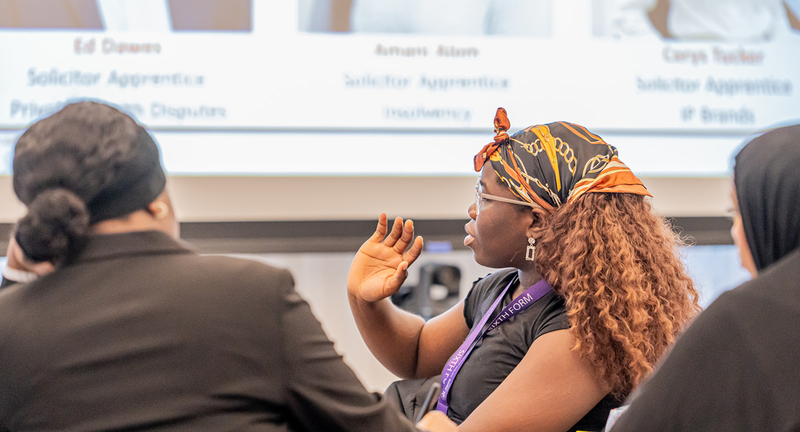
Aligning careers education with modern day careers
In the modern professional landscape, which is influenced by technological advancements, diversity and inclusion efforts and the emergence of new job roles, there is a need to better bridge the gap between the classroom and workplace. This blog post explores how employers can support students in their careers education and help them gain a better-informed understanding of the evolving dynamics of today’s work environment.
Acknowledging the changing needs of today's workforce, especially the importance of interpersonal skills, we stress how the younger generation can gain significant advantages by actively connecting with employers.
Throughout this article, we discuss key themes such as career awareness, future skills, sustainability and wellbeing. By addressing the need for alignment between education and workforce demands, the aim is to contribute to the preparation of a more informed and adaptable workforce entering the professional realm.

Career awareness
Navigating the journey from education to the workplace is a critical journey for students, yet the link between careers education and career pathways often remains unclear.
Students need access to career information to help them make informed choices and match their interests and skills. For those without connections to the professional world, it can be difficult and overwhelming to navigate the possibilities of their future.
In addition to not feeling well informed about certain careers, many can struggle to envision themselves in specific industries or jobs, if there are no relatable role models in that field. By showcasing diverse role models and success stories, employers can emphasise the value of different backgrounds and perspectives in the professional realm. This not only breaks down barriers but also creates an inclusive environment where young people from various walks of life feel empowered and inspired to consider these careers.
The importance of educating educators shouldn’t be underestimated. Employers play a pivotal role in equipping teachers with accessible career information to empower and educate students. Providing teachers with firsthand industry knowledge and resources to ensure they’re familiar with the evolving job market is a crucial aspect of supporting the next generation of leaders. We work directly with schools and employers to ensure there is a connection between what is happening in the professional world and what students are being taught about the different career avenues. Through school sessions and accessible courses, misconceptions and myths are debunked to support young individuals with their career journey.
Future skills
In today’s fast-changing world, where technology is becoming more integrated into our daily work life than ever before, it’s important that students understand the benefits and the limitations of technology and human capabilities. Employers and educational institutions can elaborate to shape a curriculum that not only includes practical training in emerging technologies but also places a significant emphasis on interpersonal skills. As we navigate the influential landscape of Artificial Intelligence (AI) in 2024, tools like chatbots are becoming integral parts of the workforce, but there are certain human capabilities that cannot be replaced.
While technical skills are vital, the emphasis should extend to areas where human attributes such as creativity, compassion and innovation excel. The challenge is not just about preparing for AI augmented work, it is about fostering a symbiotic relationship between human creativity and machine efficiency.
Employers can actively contribute to students' careers education by working with third-party companies, hosting industry specific events, webinars or workshops to provide students with insights into the trends and technologies relevant to their field. These initiatives also offer a platform for young individuals to develop and showcase their interpersonal skills.
Sustainability and wellbeing in the workplace
Recognising the shifting priorities of Generation Z, who place a high value on environmental responsibility and personal wellbeing, is pivotal for employers aiming to foster a more sustainable and supportive workplace. As these individuals tend to switch jobs within a relatively short span, typically around two years, accommodating their expectations can significantly impact employee retention positively.
Incorporating sustainability practices within the organisational framework not only aligns with the eco-friendly values of the younger generation but also sends a powerful message about shared values. By rethinking workspaces, promoting circular processes and actively reducing environmental impact, employers not only contribute to a greener future but also appeal to the environmentally conscious Gen Z, potentially increasing their job satisfaction and loyalty.
Similarly, acknowledging the importance of mental health and wellbeing is crucial in cultivating a workplace culture that resonates with the needs of Gen Z. Given that mental health issues can lead to long term sick leave, and workplace dissatisfaction, employers who actively support and promote employee wellbeing through initiatives such as wellness programmes, buddy systems and continuous learning opportunities are more likely to retain their talent for more extended periods.
Considering that wellbeing is not an aspect extensively explored in traditional school curricula, employers and educators can emphasise the importance of work-life balance for personal growth. In this way they contribute to a more holistic and supportive educational and professional environment.
We connect students with various companies, which helps to shed light on their organisational cultures and position themselves as meeting the expectations of the younger audience. They can also use this platform to showcase and explain their wellbeing practices, underlining why they are essential. This not only contributes to a greener and healthier future but also aligns with the eco-friendly values of the younger generation.
In conclusion, as the professional landscape evolves with technological advancements, diversity and inclusion efforts and the emergence of new job roles, there is a pressing need to bridge the gap between the classroom and workplace. By doing so, employers and educators contribute to preparing a well informed and adaptable workforce as they enter the professional world.
We’re looking to work with more employers across the UK to better educate the younger generation of the careers of the modern working world. Book a meeting with the team and see how we can raise your brand awareness.
By Uptree
Published on:
Wed 24 Jan 2024